JUMP CUT
A
REVIEW OF CONTEMPORARY MEDIA
![]()
The Longest Summer

Ga Yin and his comrades face unemployment after discharge from the British Army.


These fellows are aware of how much they have lost as, at the end of the film, they ironically watch the fireworks celebrating Hong Kong's transition from British to Chinese rule.

Made in Hong Kong

This low-budget production is told from the point of view of Autumn Moon, an affable youth who hardly fits the profile of mob debt collector. Much of the film is told from his perspective; in this scene his voice over narration comments on the kind of broken-family life that makes youth take to the streets.


16-year old Ping lives in this high rise complex, where the working class families are constantly in debt.


Mobster Fat Chan says he will forgive the debt if the mother lets her daughter sleep with him to pay it off.


Autumn Moon is fascinated with guns in a fantasy way, and he agrees...


...to kill someone for his boss, who here gives him the gun for that job.


When time comes for the killing to be done, Autumn Moon wears headphones playing loud music, heard on the soundtrack throughout the sequence. It's as if he is still inside his fantasy world and...

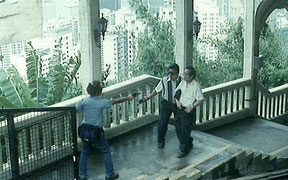
...botches the actual killing, shown in long shot.


The music continues as Autumn Moon stumbles running down the funicular tracks.

.


.


Little Cheung

This nine-year old works as a delivery boy for his father's tea house in the crowded Hong Kong neighborhood of Mongkok.


Sometimes he "sullies" the tea of customers he does not like.


Fruit Chan explores the lives of Hong Kong's immigrants, here that of the Filipina maid working for Cheung's family.


Triad members threaten Cheung's mother and father, who stand up to them. Their older son was lost to them since he joined the gangs.

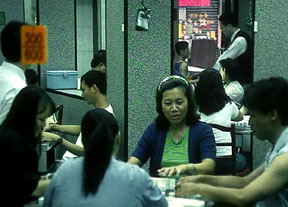
Cheung receives little emotional support from his parents. Here he delivers tea to his mother, occupied in a mahjong parlor.

The class imaginary in
Fruit Chan's films
"The discrepancy between the rich and poor has always been an issue in Hong Kong, but the problem was swept under the carpet during the economic boom. After the financial crisis, the bubble burst for the middle-class. All of a sudden, people notice that Hong Kong is crawling with poor people."
— Fruit Chan
Despite the fact some of the early Hong Kong films dealt with social injustice, inequities, and the gap between rich and poor, Hong Kong cinema has rarely taken as its theme the concept of class. Only with the work of Fruit Chan do we begin to see the persuasive articulation of class in cinematic terms. The objective of this short essay is to focus on the class imaginary inscribed in Fruit Chan's cinema. The films of Fruit Chan compel our attention because they force us to recognize the class predicament of the urban proletariat in interesting ways.
Class as a concept is central to Marxist thought and social analysis. Despite the fact that Marx did not develop this concept with the comprehensiveness that one would have wished for, it pervades his theorizations about social transformation and social movements. According to him, classes were the primary groups through which social conflicts developed, and Marx and Engels made clear the weight should they attached to the concept of class in the opening sentence of the Communist Manifesto:
"The history of all hitherto existing societies is the history of class struggles."[1] [open notes in new window]
Similarly, in the Manifesto Marx and Engles wrote,
"Society as a whole is more and more splitting into two great classes directly facing each other, bourgeois and proletariat."[2]
They also went on to assert that the ideas of the ruling class in every epoch are the ruling ideas of society.
According to Marx, divisions of class do not operate in all societies. For example, tribal societies do not have classes, since in such societies surplus of production and private property are absent. Divisions of class emerge when surplus is created, resulting in the emergence of a class of non-producers who live off a class of producers. The class consequences of the production of surplus value also explain much about contemporary society. However, in recent years, Marxist conceptualizations of class have been challenged by scholars who feel that modern societies have disproved Marx's predictions and that the structures and internal dynamics of the twentieth and twenty-first century societies are far more complex than he had imagined. As a consequence, there has been a rethinking of the role of class in modern society and social development. While this is indeed a move that needs to be welcomed, rather than discard the concept of class, we need to re-examine its heuristic validity in the light of contemporary social changes and social theory. What is interesting about Fruit Chan’s work is that it allows us to focus on class as an important concept in understanding the filmic representations of social experience.
Fruit Chan was born in Guanzhou in 1959 and was raised in Hong Kong. In the 1980s, he entered the film industry and worked initially as an assistant director in the commercial cinema, working even with Jackie Chan. In 1991, he made his first feature film titled Finale in Blood and in the same year he directed another film called Five Lonely Hearts. Clearly, both of these films worked within the narrative discourse, regimes of visuality, representational codes and conventions associated with Hong Kong popular cinema. In 1997, Fruit Chan directed Made in Hong Kong, which was both a critical and popular success, and led to his emergence as a bold and imaginative filmmaker, one who chose to abandon the imperatives of commercial cinema. He was recognized as an independent filmmaker who had created a personal space in which to explore and reconfigure his main preoccupations, which focused especially on the nature, constitution, and the future growth of the urban proletariat in Hong Kong.
The genesis of Fruit Chan's films is as interesting as the films themselves. To read his films is also to probe into the conditions in which they were made, since they are intimately related to the historical moments of their production. Made in Hong Kong, for example, is a low-budget film that cost only a fraction of the capital needed to make an average film in Hong Kong. It was shot using twenty four hundred meters of leftover unprocessed film. A five-member crew assisted him in the making of the film and all of them worked for free. The post-production costs were also minimal by normally accepted standards. Andy Lau, the well-known singer and actor, provided Fruit Chan with a production office and other material requirements. The well-known director and distributor and critic, Shu Kei, helped him in the post-production.
Made in Hong Kong focuses on the privations and predicaments of the alienated proletarian youth in Hong Kong just before the handover of Hong Kong to China. The film centers on the character of a young man, Autumn Moon, existing precariously and compelled to live at the edges of society; he is invariably sucked into the underworld of violence and gangsterism. The film's entire story is narrated through Autumn Moon's eyes and sensibility, especially through a voiceover that frequently communicates his thoughts and observations. We feel a measure of sympathy for him as an affable young man who could have done better in life, had he been permitted to live under better social circumstances. The female protagonist of the film, Ping, in whom Autumn Moon is interested, is dying of a life-threatening illness. Through Autumn Moon's calculated actions, Fruit Chan explores the registers of consciousness and the symbolic world of urban proletarian youth, and thus the film confers visibility on the invisible. While Made in Hong Kong seems to eschew the formulas of the commercial cinema, Fruit Chan nonetheless draws on two of Hong Kong's popular genres, gangster films and melodramas, with provocative imagination. In a sense, then, Made in Hong Kong draws on commercial cinema to challenge its presuppositions in its home ground.
The Longest Summer, made in 1999, is Fruit Chan's second film as an independent film director. The production of this film was also generously supported by Andy Lau. This film focuses on a group of locals who were rendered jobless after the British Army left Hong Kong in 1997. While Hong Kong celebrates its liberation from British rule, the locals in the disbanded British army face a future of uncertainty. Go Yin, one of these disaffected young men, decides to join his brother Go Suen in illegal activities associated with the underworld. They rob a bank and the film charts the robbery's consequences. Once again, Fruit Chan displays his penchant for using both narrative and visual registers to probe into the problem-riddled lives of Hong Kong's socially disadvantaged and marginalized people. This film, too, works within the narrative discursivities and representational codes of gangster films, but Fruit Chan is careful to use these codes critically. His aim is not to infuse his filmic text with a sense of heroism but to offer a commentary on the difficult task of survival for the beleaguered urban proletariat. The violence that informs the film is a comment on the uncertain lives of the proletariat, the uneasy tensions and strains and stresses of youth, and the social ontology of the urban working class.
The next film by Fruit Chan is Little Cheung, made in 1999. This film deploys gangsterism less prominently, although gangsters are there unmistakably in the background — a perpetual and troubling reminder of the forces that shape the life of the urban proletariat and lumpenproletariat. As the story is seen through the eyes of children, the confrontation between the innocence of children and the brutality of adult society serves to underline the harshness of proletarian life. The relationship between Little Cheung and Ah Fan, for example, stands as a counterpoint to those existing among adults. In an interview, Fruit Chan once wistfully remarked that life is inescapably complicated and how nice it would be if we did not have to grow up. In this film, in both the narrative and visual registers, Fruit Chan employs the topos of childhood innocence as a way of drawing attention to the corrupting influence of adulthood amidst the life-denying conditions of the urban working class.
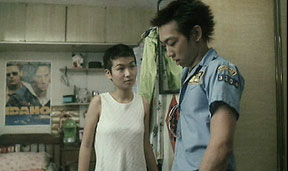 |
 |
| His relation with Ping starts in a low-key way when he comes diffidently to collect a debt and she offers to sleep with him to pay it off. | She tells him she needs a kidney in order to live and he vows to get the money, but fails as a hit-man. |
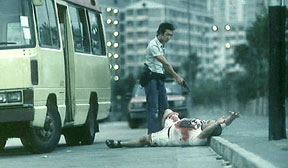 |
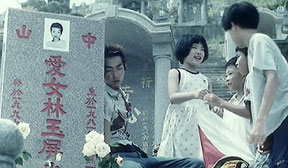 |
| After the fantasy set-up of the assassination attempt, when he kills Fat Chan, the image is framed in a much more mundane way and there is no loud music soundtrack. | Autumn Moon slumps at Ping's grave. Fruit Chan's characteristic audio/visual style emphasizes social contradictions, here by showing children playing nearby. |
Fruit Chan's next film was Durian, Durian, made in 2000, which won great critical acclaim. The complicated relation between China and Hong Kong constitutes the background of the story of Durian, Durian, which focuses on Yan, a Chinese prostitute working in Hong Kong. Prostitutes are victims of both the capitalist and patriarchal regimes, and to discuss prostitution entails a discussion of class. Often, the trope of prostitution is used in fiction to stand as a commentary on class exploitation. In Marxist terms, since prostitutes do not create objects for sale but are themselves up for sale, prostitution signifies the degradation of both the human body and human dignity through being subject to the instrumentalities of commodification. Fruit Chan is well aware of the implications of this in Durian, Durian, where once again, the predicament of the proletariat forms the essence of the film, in this case commenting on the increasingly common phenomenon of Chinese immigrants working as prostitutes in Hong Kong. The film consists of two parts: the first part focuses on the life of the proletariat in Hong Kong with all its harshness, routinization, and hustle and bustle while the second part deals with life in China after Yan has returned to her homeland. Here the tranquility and peace of North Eastern China is contrasted with the frantic life in Hong Kong, with Yan's homeland presented as "felicitous space" (in the way Gaston Bachelard has employed this term).
In 2001 Fruit Chan made Hollywood Hong Kong, which continues his interest in the plight of the marginalized and oppressed. A mixture of social critique and black humor, this film also deals with prostitutes, but is different from Durian, Durian in that in the latter film the viewpoint of the prostitute comes across cogently while in Hollywood Hong Kong it is less certain. There is a certain measure of vagueness about the main character. She comes into a squatter area earmarked to be demolished and at the end leaves for Hollywood to pursue her cherished desires. Tong Tong dreams of Hollywood while living in a shantytown and this contrastive topos provides the backbone of Chan's analysis. Durian, Durian and Hollywood Hong Kong textualize similar experiences, but from divergent stylistic and representational vantage points. In the latter film, the juxtaposition of highrise buildings and shantytowns serves to portray a Hong Kong of sharp contrasts. Interestingly, the film works not so much at the level of realism as that of fantasy. Stylization is an important part of the meaning of the film. The sense of absurdity that pervades the film is vitally connected with the social critique that Fruit Chan offers us. He seems to indicate that one need not be restricted to a narrow understanding of realism in order to delve into social inequities.
In 2002, Fruit Chan made Public Toilet, which in many ways is his weakest film. Dong Dong was born in a public toilet and he is referred to as the god of toilets. As the film recounts the quest for a miracle cure, the urinal becomes the central trope and brings together diverse narrative strands of a rambling story that moves from Hong Kong to Korea to China to India and to the United States. The proletarian consciousness is not absent in the film; but Public Toilet's narrative has a certain aimlessness which vitiates its meaning. Although the film has both the element of human compassion and the element of fantasy that one finds in many of Chan's earlier works as well, its narrative energy seems unnecessarily dissipated.
In 2004 Fruit Chan made Dumplings. A shorter version was included in Three Extremes (2002), which had works by two other distinguished filmmakers as well. Dumplings examines the predicament of an aging actress who yearns to recapture her earlier vivacity. She approaches Aunty Mei, whose dumplings have the strange ability of bringing about rejuvenation. It so happens that Aunty Mei makes use of human fetuses in making her strange dumplings. The film explores issues of youth, aging, and bioethics. Some in the audience would, no doubt, find this mixture of the horror and black comedy genres distasteful. Here, too, Fruit Chan's penchant for portraying proletariat consciousness is present, although perhaps not in the focused way that characterized his earlier work. The film develops a contrast between the Chinese immigrant working class and the anglicized Hong Kong middle class — especially in terms of their respective life styles, modes of thinking and worldviews. With abortion a dominant trope in Dumplings, the two settings for abortions characterizing the working class and the middle class serve to underline the disparities among the two classes. What is most remarkable about the film is the innovative camerawork of Christopher Doyle who brings an interesting visuality to this somewhat strange story.
To
top![]() Print
version
Print
version![]() JC 49
JC 49 ![]() Jump
Cut home
Jump
Cut home

This work is licensed under a Creative Commons Attribution-NonCommercial-NoDerivs 2.5 License.